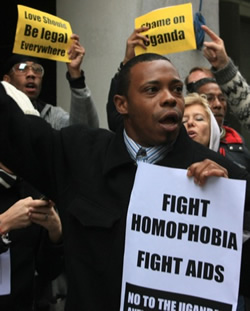Anti-Homosexuality Bill in Uganda Imperils AIDS Work
January 8, 2010—As Ugandan lawmakers prepare to debate a bill that would impose harsh criminal penalties for same sex behavior, AIDS advocates warn that the legislation poses a severe threat to ongoing efforts to combat HIV/AIDS among Ugandan men who have sex with men (MSM), a population at high risk of HIV infection.

Photo: Wikimedia Commons |
Although there have been recent reports that its harshest provisions may be scaled back, Uganda’s anti-homosexuality bill as originally proposed would impose a range of severe punishments for homosexual acts, including the death penalty for “aggravated homosexuality,” which includes any same-sex sexual activity by people who are HIV positive. The legislation also calls for imprisonment of anyone who fails to report individuals who engage in homosexual acts—a provision that would effectively criminalize the efforts of all organizations working in the lesbian, gay, bisexual, and transgender (LGBT) communities, including those delivering lifesaving HIV/AIDS prevention, treatment, and care.
“This bill is a violation of human rights. If enacted, it would force LGBT Ugandans further underground, undermining the efforts of local organizations to provide essential HIV/AIDS prevention and treatment education and services,” said Kent Klindera, manager of amfAR’s MSM Initiative, which provides support to grassroots MSM organizations around the world—including a group in Uganda whose work would be outlawed under the terms of the proposed legislation and whose members would be imprisoned. Klindera and other advocates point out that the new legislation could undo Uganda’s widely noted success in combating the AIDS epidemic.
Ugandan law already prohibits “carnal knowledge of any person against the order of nature,” a statute that has been used to threaten, extort, and detain members of the LGBT community. “If this bill is passed, MSM will be even more reluctant to get tested for HIV or to seek treatment for fear of arrest, imprisonment, and worse,” said Klindera.
Public health advocates remain hopeful that mounting local and international pressure will induce Ugandan lawmakers to shelve the bill and recognize that denying human rights is not effective public health policy. The U.S., which provides funding to Uganda through the President’s Emergency Plan for AIDS Relief (PEPFAR), is among those nations calling on the government to abandon the legislation.